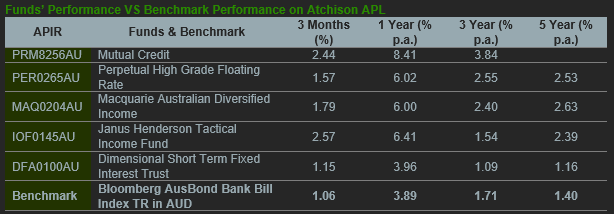The bond market resurgence: 2023’s top Australian bond managers unveiled
Fixed income, in particular the bond market, staged a remarkable comeback in 2023.
Here are some reasons behind the resurging interest (pardon the pun!)
- Cooling inflation: Australia’s inflation, which once scaled the heights of 7.8 per cent in December 2022, has taken a slide down to 5.4 per cent by September 2023. This shift hints at a possible easing off on the previous aggressive rate hikes.
- Desirable yields: With yields riding high, bonds are offering the allure of better returns plus the chance for capital gains, particularly if interest rates start to fall within the latter parts of 2024.
- Role as the diversifier: Fixed income became correlated with equities in 2022. However, a shift towards a more typical interest rate cycle suggests a return to their fundamental diversification role in portfolios. Overall, moderating inflation and possible monetary policy easing are poised to bolster the fixed income sector.
Atchison Consultants has been generally making progressive and pragmatic additions of long-duration fixed income positions, as interest rates near their peak terminal rate.
As at December 31, 2023, the top five performers were derived from seventy-eight Australian Bond Managers from the Atchison APL.
The seventy-eight funds have returned an average of 0.05 per cent over the past three years.

Over three months, 1 year and 3 years Mutual Credit was the clear top performer, returning 3.84 per cent and outperforming the AusBond Bank Bill index by 2.13 per cent.
Fund Insights: Mutual credit
The fund seeks a 2.2 per cent return above its benchmark, focusing on senior and subordinated debt, with a portion in structured credit. It aims for positive returns annually, maintaining low duration and daily stress tests on credit duration. Investments are primarily in fixed interest credits from ADIs, corporates, and structured finance, favouring assets with shorter credit durations to mitigate risk during selloffs. Interest rate risk is managed by investing mainly in assets with reference rates resetting every 30 to 90 days.
According to the latest December report “the driver of the outperformance was credit spread compression in Tier 2 from heightened levels following a busy period of issuance in October and November”.
Fund insights: Perpetual high grade floating rate
The fund targets value addition with low-risk, akin to cash investments, through a diversified mix of corporate bonds, asset-backed securities, hybrids and discounts.
It seeks regular income for investors via deposits and fixed income assets, aiming to consistently outperform the Bloomberg AusBond Bill Index pre-fees and taxes.
Recent report suggests that key contributors to performance were the fund’s ability to generate income above the benchmark, its floating rate structure and tightening credit spreads over December.
Fund insights: Macquarie Australian Diversified Income
The Fund’s management is based on accessing different sources of value-add, as well as applying disciplined processes that are backed by in-house research and quantitative analysis. It aims to outperform the UBS Bank Bill Index over the medium term (before fees) and provide regular income by using an active investment strategy.
Corporate returns were modest yet positive, led by rate-sensitive sectors like REITs and utilities amid a global rate rally. Structured securities offered stable, low-capital-sensitive returns. Duration overweights also significantly contributed, benefiting from the continuing yield rally.
Fund insights: Janus Henderson Tactical Income Fund
The fund is an actively managed portfolio and invests across a spectrum of cash and fixed income assets, including corporate and bank debt, asset-backed securities and government bonds. It may also venture into high-yield securities globally when opportunities arise.
The strategy allows for tactical adjustments based on economic, interest rate, and corporate sector outlooks. This flexibility aims to optimize performance amid fluctuating interest rates and manage credit risk based on market fundamentals. The goal is to outperform the Benchmark through a diversified mix of primarily Australian income-generating assets, post-fees.
Factors for recent outperformance were falling yields and higher coupons driving substantial gains in longer-duration bonds, which rewarded the fund’s active duration management and prudent yield curve positioning.
Fund insights: Dimensional Short-term Fixed Interest Trust
The fund aims to surpass returns from short-term money market investments by focusing on high credit quality Australian dollar-denominated fixed interest and money market securities. It maintains a maximum weighted average maturity of 1 year, with individual securities not exceeding 2 years. Striving to maximize returns within the confines of short-term, high credit quality investments, it diversifies across domestic and global fixed interest and money markets.
Portfolio allocation includes 45.97 per cent in assets with 0–3 month maturities and 7.35 per cent of assets with 1–3-year maturities, with credit ratings ranging from A to AAA.
Summary of performances
The above fixed income managers showcased varied strengths. Macquarie leveraged banking securities and structured assets, while Janus Henderson benefited from longer bond durations. Perpetual stood out with its income generation and floating rate approach, and Mutual Credit gained from Tier 2 credit spread tightening. Dimensional’ s emphasis on short-term maturities reflects a focus on liquidity and lower rate risk, highlighting diverse strategies in the sector.










